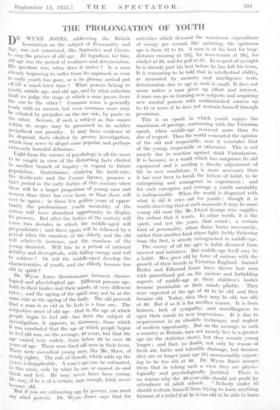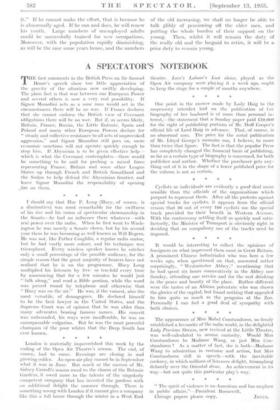THE PROLONGATION OF YOUTH
Bit., WYNN JONES, addressing the British Association on the subject of Personality and Age, was not concerned, like Sophocles and Cicero, to sing the praises of old age. Ex hypathesi, for him, old age was the period of weakness and deterioration. His question was, when does it arrive ? Is a man already beginning to suffer from its approach as soon as early youth has gone, or is its gloomy arrival put off, till a much later time .? What powers belong to Youth, middle age, and old age, and by what criterion Shall we judge the .stage at which a man passes from the one to the other ? Common sense is generally ready with an answer, but even common sense may be 'vitiated by prejudice on the one side, by panic on the other. Science, if such a subject as this comes Within its scope, may be presumed to be neither Prejudiced nor panicky. It may have evidence at its disposal, facts elicited by precise investigation, which may serve to dispel some popular and perhaps extremely harmful delusions. Light from the science of psychology is, all the more to be sought in view of the disturbing facts elicited iiianother branch of inquiry—in regard to future population. Statisticians, studying the birth-rate, the death-rate and the Census figures, promise a brief period in the early forties of this century when there will be a larger proportion of young men and Women than there has ever been, or than there will ever be again ; in those few golden years of oppor- tunity the predominant youth mentality of the nation will have abundant opportunity to display its prowess. But after the forties of the century will cone two decades in which the middle-aged will Preponderate ; and these again will be followed by a period, when the numbers of the elderly and the old will relatively increase, and the numbers of the Young diminish. Will this be a period of national debility and decrepitude, with failing energy and will to achieve ? Or will the middle-aged develop the characteristics of youth, and the elderly become less old in spirit ? Dr. Wynn Jones discriminates between chrono- logical, and physiological age. Different persons age, both in their bodies and their minds, at very different Fates;; and the ageing of the spirit may not, be at the s4naerate as the ageing of the body. The old proverb that a man is as old as he feels is a true one. The subjective onset of old age—that is, the age at which People begin to feel old—has been the subject of investigation, it appears, in Germany, from which it was concluded that the age at which people began to feel Old ,, was, on the average, 49 years, but that the age varied very widely, from below , 20 to over 80 Years, of age. There were tired old men in their teens. There .were ascendent young men, like Mr. Shaw, of nearly eighty. The rule of thumb, which adds up the Years, is inapplicable. A man's age can be estimated, in this sense, only by what he can or cannot do and think and feel. Ile may never have, been young. He rare enough, kind, never
may, if he is of a certain, "
become old. But if' you arc estimating age by powers, you must say* what powers. Dr. Wynn Jones says that for activities which demand the maximum expenditure of energy per second, like sprinting, the optimum age is from 22 to 24. A man is at his -best for long- distance running at 25k, for lawn-tennis at 28k, for cricket at 80, and for golf at 85. In respect of eyesight he is already past his best before he has left his teens. It is reassuring to be told that in intellectual ability, as measured by memory and intelligence tests, deterioration due to age as such is small. It does not occur unless a man gives up effort and interest. A man can go on learning new subjects and acquiring new mental powers with undiminished success up to 45 or more if he does not restrain himself through pessimism. This is an epoch in .,which youth enjoys the maximum of prestige, contrasting with the Victorian epoch, when middle-age . received more than its due of respect. Then the world venerated the opinion of the old and respectable, now it venerates that of the young, respectable or otherwise. This is not merely due to reaction against staid Victorianism. It is because, in a world which has outgrown its old equipment and is needing a drastic adjustment of life to new conditions, it is more necessary than it has ever been to break the fetters of habit, to be enterprising and courageous in experiment ; and for such enterprise and courage a youth mentality is indispensable. When the world is disgusted with what is old it cries out for youth ; though it is worth observing that at such moments it may be some young old man like Mr. Lloyd George who supplies the ardour that it wants. In other words, it is the spirit, and not the years, that count ; a certain kind of personality, whose flame burns incessantly, rather than another kind whose light, feebly flickering from the first, is utterly extinguished in middle-age. The enemy of all the ages is habit divorced from interest and initiative. But middle-age itself may be a habit. Men grew old by force of custom with the growth of their beards in Victorian England. Samuel BUtler and Edmund Gosse have shown how men with parenthood put on the austere and forbidding aspects of middle-age as their children's bodies became' punishable or their minds pliable. They
and they
were expected at. the age of 40 to be old, became old. Today, also, they may be old, too old, at 40. But if so it is for another reason. It is from laziness, lack of sympathy, and unwillingness to open their minds to new impressions. It is due to acquiescence in an obsolete technique, and neglect of modern opportunity. But on the average, in such a country as Britain, men not merely live to a greater age (as the statistics show), but they remain young longer ; and that, no doubt, not only by reason of fresh air, baths and tolerable, drainage, but because they are no longer (pace age 21) unreasonably expect- ing to be too old at 40. Dr. Wynn Jones assures them that in taking such a view they are physio- logically and psychologically justified. There is no reason why the 40-.year-olds should not profit by attendance at adult schools.. " Nobody under 45 should restrain himself from trying to learn anything because of a belief that he,is too old to be able to learn it." If he cannot make the effort, that is because he is abnormally aged. If he can and does, he will renew his youth. Large numbers of uneniployed adults could be successfully trained for new occupations. Moreover, with the population rapidly diminishing, as will be the case some years hence, and the numbers of the old increasing, we shall no longer be able to talk glibly of pensioning off the elder men, and putting the whole burden of their support on the young. Then, whilst it will remain the duty of the really old and the languid to retire, it will be a prior duty to remain young.







































 Previous page
Previous page